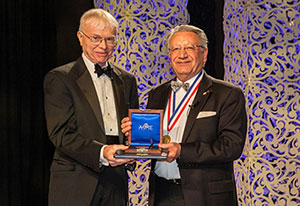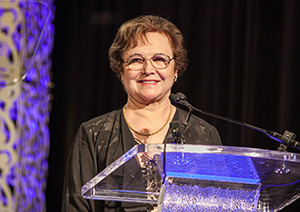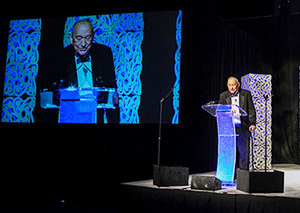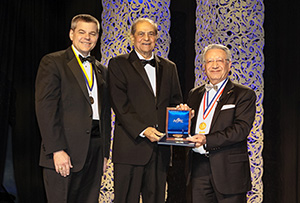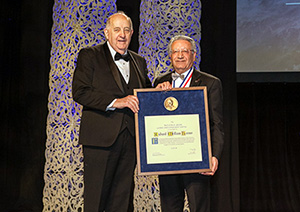Honors Assembly Highlights the Accomplishments of Leading Engineering Innovators
Honors Assembly Highlights the Accomplishments of Leading Engineering Innovators
ASME paid tribute to the achievements and contributions of nine leaders of the engineering profession — including Thomas J.R. Hughes, the 2018 recipient of the ASME Medal — at this year’s Honors Assembly, which took place Nov. 12 during the International Mechanical Engineering Congress and Exposition (IMECE) in Pittsburgh, Pa.
Dr. Hughes, professor of aerospace engineering and engineering mechanics and the Peter O’Donnell Chair in computational and applied mathematics at the University of Texas at Austin, received the highest award bestowed by the Society, the ASME Medal, for his pioneering work developing computer-aided engineering and design technologies, and for originating and leading new fields of computational engineering research.
As he accepted the medal, Hughes related his introduction to the world of computers as a student at Pratt Institute in Brooklyn, N.Y., in the 1960s. “We would admire it through a glass wall,” Hughes said of university’s first computer, which was off-limits to the student body. “Somehow — and I don’t remember how — I obtained a key to that room. And late at night, I used to go into that room. That’s how I learned to program computers.
“Subsequently, I did get a job at General Dynamics’ Electric Boat,” he continued. “That was where I first heard the words ‘finite element method,’ and I became intrigued. I became convinced that mechanical engineering problems of every variety could eventually be approached by computers and the finite element method. So I began a journey that has taken me throughout my entire career.”
Another of the night’s honorees, Gwynne Shotwell of the space transportation company SpaceX, was this year’s recipient of the prestigious Ralph Coats Roe Medal. Established in 1972, the award recognizes an outstanding contribution toward a better public understanding and appreciation of the engineer’s worth to contemporary society. Shotwell, who is president and chief operating officer at SpaceX, was acknowledged for outstanding leadership and innovation for space commercialization, for technical contributions to the design of reusable rockets, and for the promotion of STEM education.
Although she was unable to attend the awards ceremony, Shotwell accepted her award in a prepared video that was shown during the event. After thanking ASME and the Board of Governors in her remarks, Shotwell expressed the personal significance of receiving the Ralph Coats Roe Medal.
“As a mechanical engineer, this medal is particularly special for me,” she said. “In part, this medal highlights how engineers make life better. I didn’t always understand what an engineer did or how they really added value to people’s lives.” That changed, however, when she attended a Society of Women Engineers event as a teenager with her mother. “I learned what an engineer did, and how they helped society. And from that day forward, I wanted to be an engineer and actually I wanted to be a mechanical engineer — and I never veered from that.
“An engineering education is incredibly important to making people’s lives better in the future,” Shotwell observed at the conclusion of her remarks. “I applaud the American Society of Mechanical Engineers for helping facilitate this. I’m honored to accept this award and really proud to be among the other awardees in the room tonight.”
Robert Nerem, who was named an ASME Honorary Member at the event, took his opportunity at the podium to share a few of the “Rules of Life” that he has imparted to his graduate students at Georgia Institute of Technology over the years. Dr. Nerem, a professor emeritus at Georgia Tech, was one of four ASME members receiving Honorary Membership during the Honors Assembly. Nerem was recognized for contributions to the understanding of the dynamics of blood flow in health and disease and to the development of tissue engineering and regenerative medicine, and for leadership in creating opportunities for engineers to play a vital role in advancing medicine.
“The first (rule) I’ll tell you is: You have to be prepared to give up the life you’ve planned in order to have the life that awaits you,” he said. “When I was a Ph.D. student, I never thought that my career would take the direction it did. And yet, my career has been extremely meaningful.” Another of his rules, he told the audience, was to “be open in the widest way possible to new opportunities and new people because that becomes your life experience.”
As his acceptance speech drew to a close, Nerem observed that while people may not always remember what you said, they will remember how you’ve made them feel. “When tonight is over, I probably won’t remember all the nice things that have been said about me, but I will remember how tonight’s occasion made me feel,” he said. “It’s been very special.”
Honorary Membership, which recognizes a lifetime of service to engineering or related fields and is the Society’s highest level of membership, was also awarded to three other engineers during the ceremony: Portonovo Ayyaswamy, the Asa Whitney professor of dynamical engineering at the University of Pennsylvania; Alan Needleman, a university distinguished professor at Texas A&M University as well as a Texas A&M Engineering Experiment Station distinguished research professor in the department of materials science and engineering; and Frank E. Talke, professor of mechanical engineering and endowed chair at the Center for Memory and Recording Research at the University of California, San Diego.
Kamlakar Rajurkar, a College of Engineering Distinguished Professor of Mechanical and Materials Engineering at the University of Nebraska–Lincoln, received the M. Eugene Merchant Manufacturing Medal of ASME/SME. Dr. Rajurkar was honored for contributions to enhance the productivity of nontraditional machining processes used in automobile, aerospace and medical device manufacturing through extensive research in process modeling as well as sensing and control techniques.
Richard William Barnes, president of ANRIC Enterprises Inc. in Toronto, Canada, was the recipient of this year’s Melvin R. Green Codes and Standards Medal for his leadership in the research, development, promotion, acceptance and application of ASME codes and standards and for management in the design, construction and operational support of nuclear power plants.
Ivar Giaever, chief technology officer at Applied BioPhysics Inc. in Troy, N.Y., was this year’s recipient of the Nancy DeLoye Fitzroy and Roland V. Fitzroy Medal for pioneering contributions to the frontiers of engineering that have led to a breakthrough in existing technology, or to new applications or new areas of engineering endeavor. Dr. Giaever, who is also an Honorary Member of ASME, was recognized for his innovative experimental research in superconductor tunneling that has advanced the understanding of the phenomenon of superconductivity and led to the development of new scientific instruments. Charles Keese, who co-founded Applied BioPhysics with Dr. Giaever in 1991 and currently serves as president, accepted the award on Giaever’s behalf.
